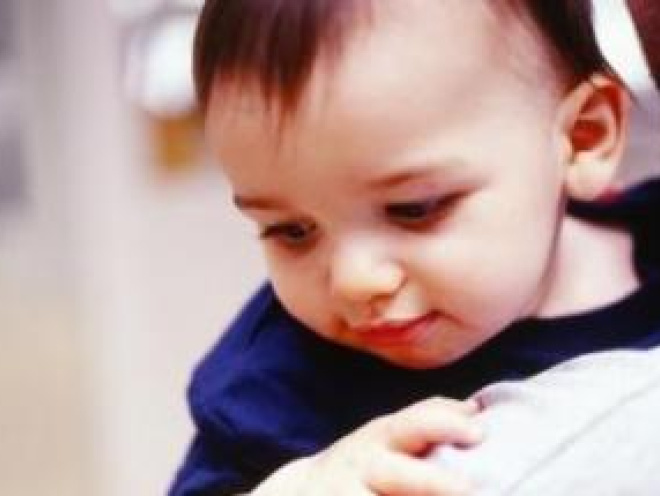We look at posseting, reflux, gastro-oesophageal reflux disease and silent reflux in babies, with suggestions on how to help soothe your baby’s symptoms
What is posseting or reflux?
Posseting is when babies bring up a small amount of milk (usually a teaspoonful) without seeming to mind (NHS start4life, 2019). Posseting is common in babies under six months old for completely normal physiological reasons and doesn’t need medication.
Reflux can occur because the ring of muscle between the oesophagus (food pipe) and stomach is not fully developed. This means food or milk can travel back up the food pipe (NHS, 2019).
Some symptoms of cow’s milk protein allergy can be similar to reflux symptoms, especially in babies who have eczema or asthma, or a family history of eczema or asthma (NICE, 2019).
About half of all newborn babies get reflux and it isn’t usually cause for concern (Kwok, 2018; NICE, 2019). Almost nine out of every ten babies affected are better by the time they're 12 months old (Kwok, 2018; NHS, 2019; NICE, 2019). That’s because over a baby’s first 12 months, their digestive system naturally develops and they spend more time upright as they start to sit up (Tighe et al, 2014; NHS, 2019; NICE, 2019).
Is reflux ever a problem?
Baby reflux is different from gastro-oesophageal reflux disease (GORD), which is defined as reflux with 'troublesome symptoms or complications' (NICE, 2019).
Baby reflux signs and symptoms
Many of the common signs of baby reflux can also be signs that a baby is distressed for any number of reasons; for example, they’re hungry, need a cuddle or they’re cold. So it’s good to remember that while there are some recognisable signs of baby reflux, this isn’t necessarily a disease that needs to be medicated. Symptoms of a baby having reflux that does not need medication are:
- Spitting up milk during or after feeds several times a day, which may upset them.
- Hiccups.
- Being mildly unsettled, crying or needing to burp after feeds.
Symptoms of GORD:
- A baby arching their back and turning their head.
- Pain or discomfort in your baby's chest or abdomen.
- Crying for long periods and becoming irritable during and after feeds; their crying may sound hoarse.
- Choking/gagging or coughing during a feed, or seeming to have a sore throat.
- Frequent ear infections.
- Fighting feeds or refusing to feed.
- Poor weight gain.
- Waking very frequently at night.
- Signs of pain or discomfort when feeding.
(La Leche League GB, 2019; NHS, 2019; Raising Children, 2019)
Are some babies more likely to get reflux?
Reflux is more common among babies who were born prematurely and babies who had a low birth weight. It’s also common in babies or children with some impairment of their muscles and nerves, such as cerebral palsy, or those with a cow’s milk allergy (Patient, 2018).
When should you seek medical advice?
Baby reflux isn’t usually a cause for concern if your baby is happy and is gaining weight. But if vomiting becomes more forceful, starts after six months of age, continues beyond a year or if your baby has any of the problems mentioned below, it's best to contact your midwife, health visitor or GP:
- Spitting up feeds frequently or refusing feeds.
- Coughing or gagging while feeding.
- Frequent projectile vomiting (forceful vomiting that lands some distance away).
- Green or yellow vomit (may be bile), or blood in vomit.
- Blood in poo or persistent diarrhoea.
- Excessive crying or irritability.
- Swollen or tender tummy.
- A high temperature of 38⁰C or above.
- Not gaining weight or losing weight.
(NHS, 2019; NICE, 2019; Raising Children, 2019)
Silent reflux in babies
Sometimes babies don’t spit out what comes back up but swallow it instead. Even though there isn’t any spitting up, they may show other symptoms similar to reflux, such as crying or being unsettled after feeds, or having a cough or hoarse voice. In severe cases babies may have symptoms similar to GORD. This is known as ‘silent reflux’ and treatment is similar to that given for GORD (Today’s Parent, 2018; NHS start4life, 2019).
How to help your baby’s reflux
You can help ease your baby’s reflux by making small changes to the way you feed them. If you talk to your midwife or health visitor about it, they might suggest the following:
- Continue to breastfeed, if possible, because breastmilk is easier to digest.
- Make sure your baby takes breaks during a feed. If you're bottle feeding, you could try to have a responsive/paced feeding approach.
- Gently burping your baby regularly throughout feeding.
- Giving your baby shorter but more frequent feeds.
- Keeping your baby’s head higher than their bottom during feeds.
- Keeping your baby upright for a bit after feeding.
- Changing your baby on their side to avoid any discomfort caused by lifting their legs up towards their stomach.
- If your baby has a cow’s milk protein allergy, you might need to eliminate dairy from your diet. If you are formula feeding, your doctor might suggest using special formula where the cows’ milk is partially broken down.
- If you formula feed your baby, your healthcare professional might suggest using a different, thickened or 'anti-reflux' formula. There is no evidence for these formula milks improving the symptoms of reflux; in some cases, they might even worsen the reflux (Kwok, 2018). These formulas need to be mixed with water at a lower temperature than recommended for standard formula, which may not be hot enough to get rid of harmful bacteria.
(First Steps Nutrition Trust, 2018; Patient, 2018; La Leche League GB, 2019; NHS, 2019)
Some parents might be advised to raise the head end of their baby’s cot slightly or place a rolled up towel under the mattress. There is no scientific evidence that this works and it might increase the risk of sudden infant death syndrome (SIDS) (Lullaby Trust, 2019). There is also no evidence to support the use of different or specialised bottle teats for preventing colic or reflux (Kreitschmann, 2018).
Diagnosis and treatment
Usually, babies with reflux don’t need any tests because the condition can be diagnosed based on their symptoms. Baby reflux doesn’t usually need any specific treatment either but you might find the feeding suggestions above helpful. Babies who cry uncontrollably or are in obvious pain may be prescribed an anti-reflux medication (Tighe et al, 2014; NICE 2019).
Where symptoms don’t improve with these adjustments, a feeding assessment to rule out other causes might be helpful. In rare cases, and if a healthcare professional thinks they might be helpful, an endoscopy, pH monitoring or barium swallow test can be done (NHS, 2019; NICE, 2019). Surgery might also be recommended for a small number of babies who have underlying medical conditions, such as cerebral palsy (NHS, 2019; NICE, 2019).
The parent's experience
If you have a baby with reflux, it can feel stressful and worrying at times. There’s lots of support and information out there to help you though. You can read about other parents’ experiences here.
This page was last reviewed in March 2021.
Further information
Understanding your baby’s behaviours will help you to care for them. Our NCT New Baby course gives you the space to focus on your baby’s needs, as well as your own.
If you have any questions or concerns about feeding your baby, our support line offers practical and emotional support. Call 0333 255 3308.
Living with reflux is a UK non-profit for information and support for sufferers of GOR and GORD.
Make friends with other parents-to-be and new parents in your local area for support and friendship by seeing what NCT activities are happening nearby.
First Steps Nutrition Trust. (2018) Infant milks: a simple guide to infant formula, follow-on formula and other infant milks [page 7]. Available at: https://static1.squarespace.com/static/59f75004f09ca48694070f3b/t/5b325b5d2b6a28fb4e3d1233/1530026845937/Infant-milks_a_simple_guide_May2018a.pdf [Accessed 26th March 2021]
Kreitschmann M, Epping LC, Hohoff A, Sauerland C, Stamm T. (2018) Sucking behaviour using feeding teats with and without an anticolic system: a randomized controlled clinical trial. BMC Pediatr. 18(1):115. Available at: https://www.ncbi.nlm.nih.gov/pmc/articles/PMC5857083/ [Accessed 26th March 2021]
Kwok TC, Ojha S, Dorling J. (2018) Feed thickeners in gastro-oesophageal reflux in infants. BMJ Paediatr Open. 2(1):e000262. Available at: https://www.ncbi.nlm.nih.gov/pmc/articles/PMC6045726/ [Accessed 26th March 2021]
La Leche League GB. (2017) I think my baby’s got reflux. Available at: https://www.laleche.org.uk/i-think-babys-got-reflux/ [Accessed 26th March 2021]
NHS start4life. (2019) Breastfeeding challenges. Available at: https://www.nhs.uk/start4life/baby/breastfeeding/breastfeeding-challenges/reflux/# [Accessed 26th March 2021]
NHS. (2019) Reflux in babies. Available at: https://www.nhs.uk/conditions/reflux-in-babies/ [Accessed 26th March 2021]
NICE. (2019) Gastro-oesophageal reflux disease in children and young people: diagnosis and management. Available at: https://www.nice.org.uk/guidance/ng1/ifp/chapter/reflux-in-babies [Accessed 26th March 2021]
Patient. (2018) Childhood gastro-oesophageal reflux. Available at: https://patient.info/health/childhood-gastro-oesophageal-reflux-leaflet [Accessed 26th March 2021]
Raising Children. (2019) Gastro-oesophageal reflux and GORD. Available at: https://raisingchildren.net.au/guides/a-z-health-reference/reflux [Accessed 26th March 2021]
The Lullaby Trust. (2019) The best sleeping position for your baby. Available at: https://www.lullabytrust.org.uk/safer-sleep-advice/sleeping-position/ [Accessed 26th March 2021]
Tighe M, Afzal NA, Bevan A, Hayen A, Munro A, Beattie R. (2014) Pharmacological treatment of children with gastro-oesophageal reflux. Cochrane Syst Rev. (11):CD008550. Available at: https://tinyurl.com/5n7kc3dm [Accessed 26th March 2021]
Today’s Parent. (2018) Symptoms and remedies for silent reflux in babies. Available at: https://www.todaysparent.com/baby/symptoms-and-remedies-for-babies-with-reflux/ [Accessed 26th March 2021]






